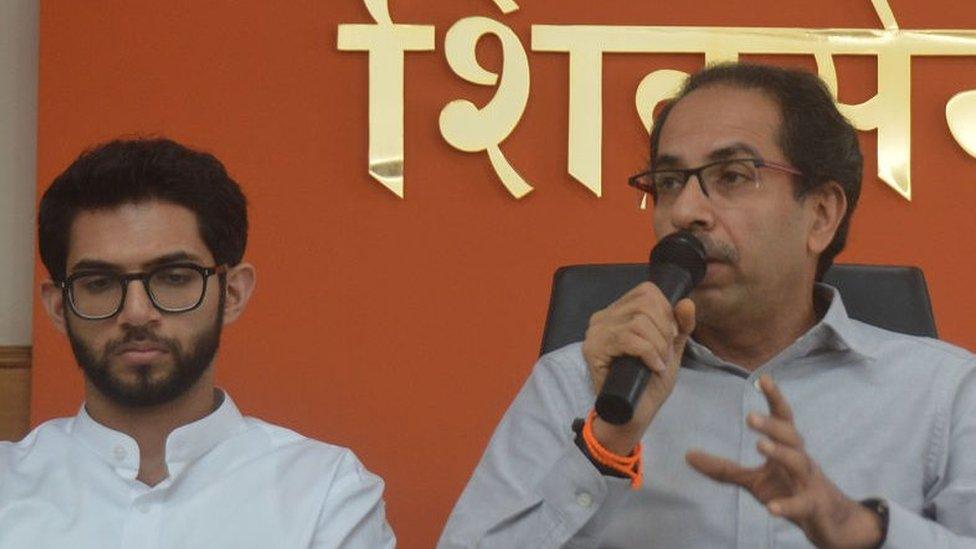Maharashtra: Is it the end of the road for Shiv Sena and Uddhav Thackeray?
- Published
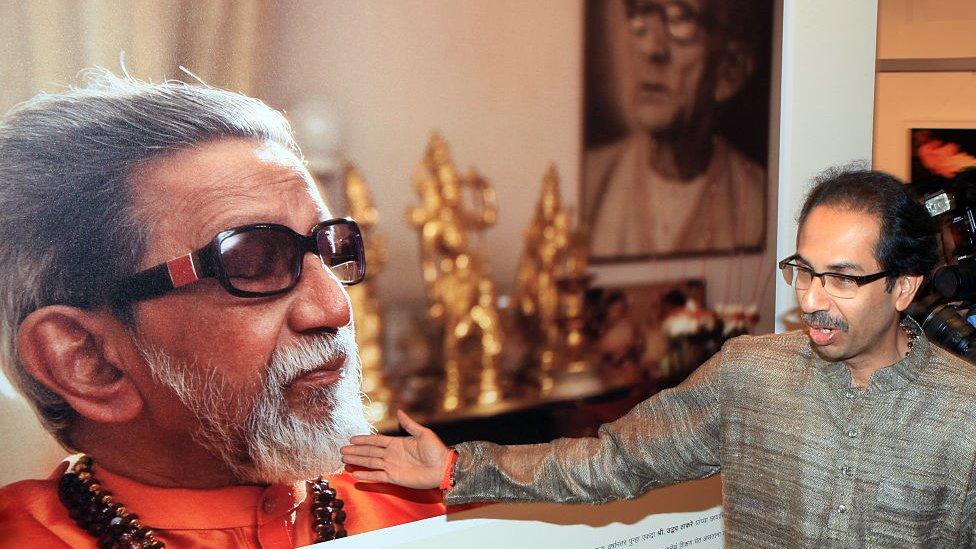
Uddhav Thackeray paying tributes to his late father in 2015
Uddhav Thackeray, the chief minister of India's richest state Maharashtra, resigned late on Wednesday after days of political uncertainty.
He seems to have pre-empted the outcome after the Supreme Court ordered his government to prove his majority in the state assembly on Thursday.
He was left with very little choice after most of his lawmakers turned rebels, saying they had no confidence in him and his coalition with the centrist Nationalist Congress Party (NCP) and the Congress.
The rebels said Mr Thackeray and his party Shiv Sena had ignored their core ideology of Hindu nationalism for the coalition.
They holed up for days in a hotel in Guwahati city in the north-eastern state of Assam, thousands of kilometres away from their home state.
The week-long political drama culminated into Eknath Shinde, the leader of the Sena rebels, taking oath as the new chief minister of Maharashtra.
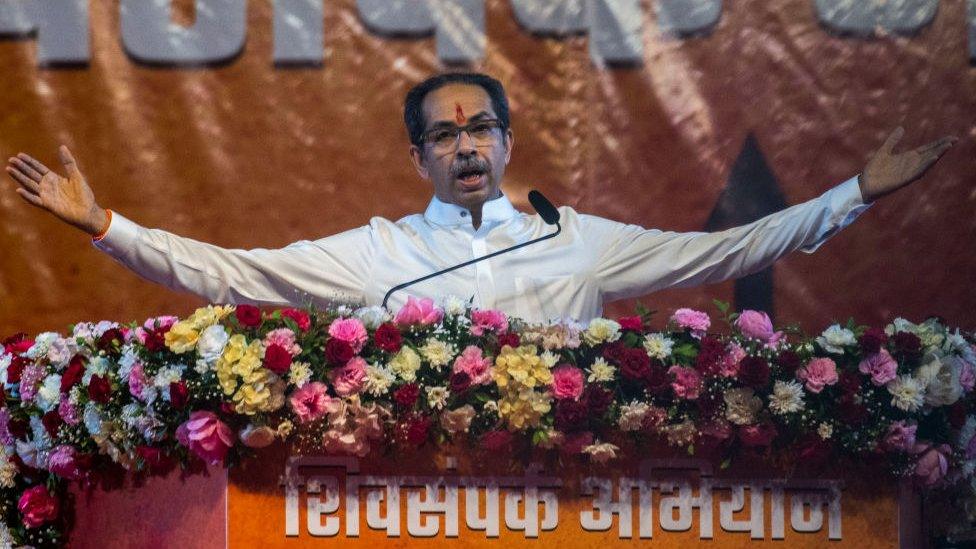
Uddhav Thackeray has lost most of his lawmakers
The rebels have formed a government with the Bharatiya Janata Party (BJP) as a partner. Former chief minister Devendra Fadnavis, who is from the BJP, has been appointed as Mr Shinde's deputy this time.
The announcement surprised political observers who had predicted that the BJP would lead the government with Mr Fadnavis as the chief minister.
It's ironic that a large number of Sena leaders have again joined hands with the BJP. The two parties were partners for more than 30 years until they broke up in 2019 over the chief minister's position.
Mr Shinde said he would not stop after ousting his boss from the chief minister's office. He said he would file a petition with the Election Commission to officially get the Shiv Sena name and its political symbol.
The Sena is at a crossroads. The BJP questioned its faith in Hindu nationalism after it partnered with centrist parties. And now it's out of the government as well.
So, what happens next for one of India's most influential regional parties?
The answers may lie in its history.
The Sena was founded in 1966 by Bal Thackeray, Uddhav Thackeray's charismatic but controversial father.
Rebellion is not new to the party. The Sena split in 1991 when senior leader Chhagan Bhujbal quit along with several lawmakers and workers. Another leader, Narayan Rane, quit the party in 2005 and took several lawmakers along with him. Uddhav Thackeray's cousin, Raj, left the party along with several lawmakers and workers in 2006.
But commentators say this time the setback is likely to leave the party demoralised.
Political analyst Suhas Palshikar says the revolt in the party "has started the downfall of Shiv Sena".
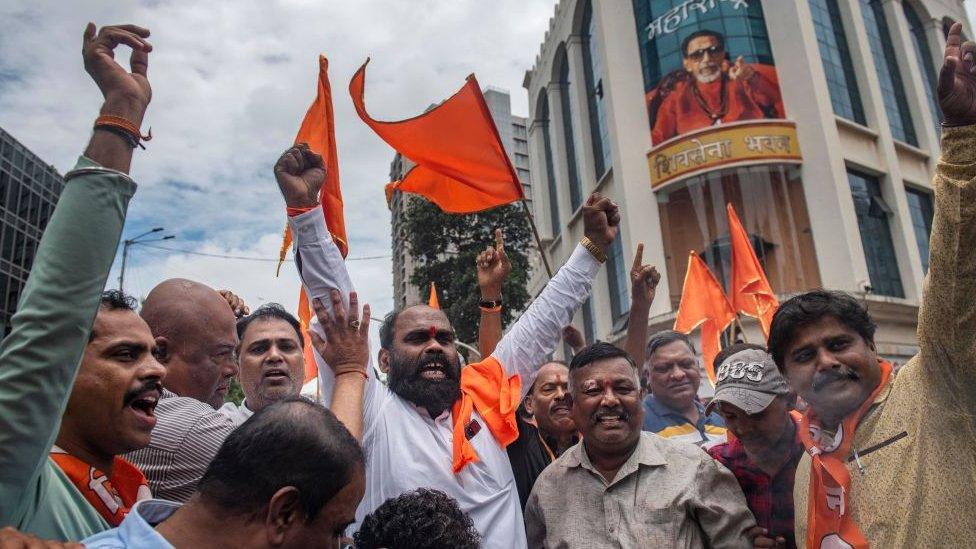
Analysts say Uddhav Thackeray needs to work to re-energise his base
Bharat Kumar Raut, a former Shiv Sena MP, echoes a similar sentiment.
"The party has never faced a crisis of this magnitude before. Grassroots supporters and workers have also deserted the party."
He adds that it's "now or never situation for both the Thackerays and the party".
In India, regional parties such as the Sena exercise considerable political clout and often defeat national parties in state elections. They also play a pivotal role if a national party fails to get the majority in federal elections.
Bal Thackeray, a political cartoonist, fought for the rights of the Marathis (those native to Maharashtra) in the face of a wave of immigration from Kerala and other southern states in the 1960s.
His fiery rhetoric made him one of India's most controversial politicians. The country's financial capital, Mumbai, experienced innumerable strikes on his orders in his heyday.
A government inquiry into the riots in Mumbai in 1992-93 blamed Shiv Sena members and several party leaders for their role in organising attacks on Muslims. But Bal Thackeray was never convicted for any offence related to the riots.
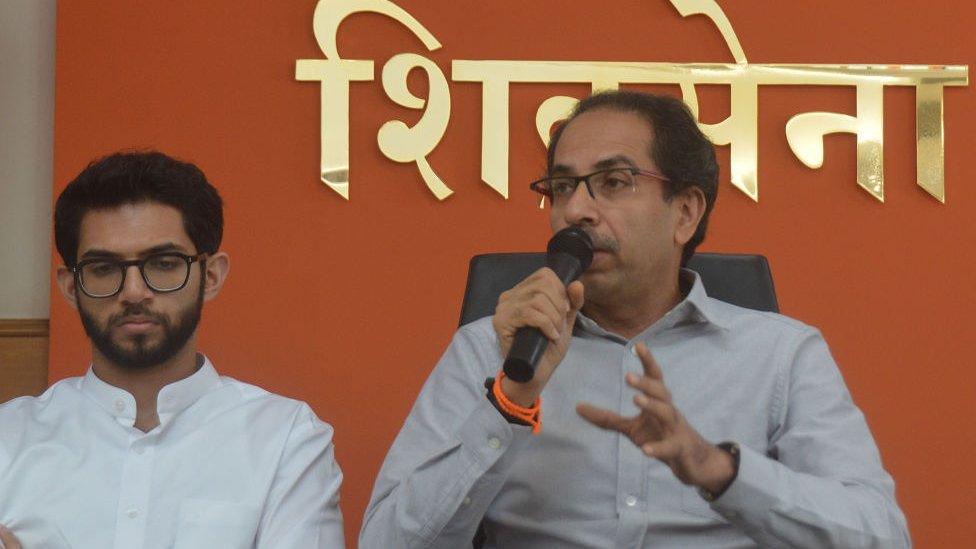
Chief minister Uddhav Thackeray (right) and his son Aaditya are trying to keep their supporters together
The Sena gained considerable notoriety in 2014-15 when it succeeded in forcing the cancellation of talks between India and Pakistan to revive cricketing ties between the two countries. It also forced the cancellation of a concert by Pakistani singer Ghulam Ali and disrupted the launch of a book by a former Pakistani foreign minister.
Analysts say the Sena will now find it difficult to energise its base and convince them it still has the same fire that brought it prominence, and sometimes notoriety as well.
A senior journalist, who has reported on the Thackerays but didn't want to be identified, says the Sena is in "serious trouble" and its chief now needs to "rebuild his party from scratch".
The party might have to spend some time in political wilderness if its 39 rebel lawmakers team up with the BJP and form the next government.
Mr Thackeray's problems will be compounded if his local workers also start supporting the rebels.
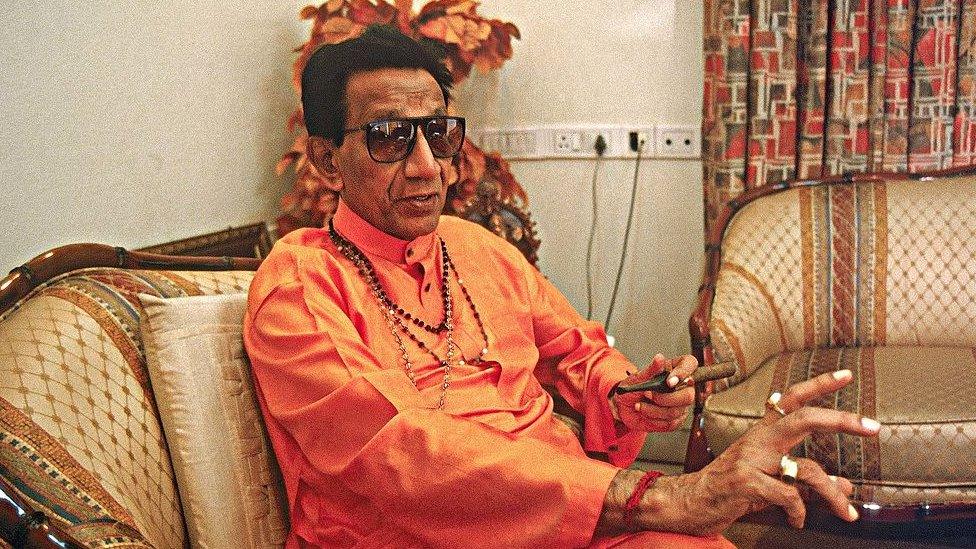
Bal Thackeray established HIndutva as his party's core ideology
It's unclear at the moment how much damage the rebellion has caused to the party's structure at district and village levels.
Gurushant Dhuttagaonkar, who heads the party in Solapur district, says that in some districts and towns, Sena workers have started pledging their loyalty to the rebels.
Lawmaker Rahul Patil is one of the few who have remained loyal to his leader, Uddhav Thackeray.
"Shiv Sena is an idea, a movement. No one can kill an idea. We are the children of Bala Saheb (Bal Thackeray). We will remain loyal to him until our death."
Sena leader Gurushant Dhuttagaonkar believes the party has emerged stronger after every setback, ''thanks largely to the fact that we were in power in partnership with the BJP".
But that partnership doesn't exist anymore. He admits that this is the biggest challenge that the Sena has ever faced.
"When you are in power, funds come regularly for the work we do in villages. If we are unable to carry out work, we lose our voters."
But Mr Patil is confident that the voters will punish the rebels in the next state election, which is more than two years away. "They are angry with the rebels. They will be taught a lesson in the elections."
Some believe that the Sena's identity is tied with the Thackerays and that will help it to bounce back.
Mr Palshikar says the party cannot exist without the Thackeray family. Uddhav Thackeray and his son Aaditya Thackeray are the heirs to Bal Thackeray's legacy.
Observers say that they will have to double down on claiming Bal Thackeray's legacy to start rebuilding their party.
Related topics
- Published27 June 2022
